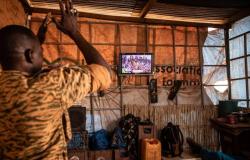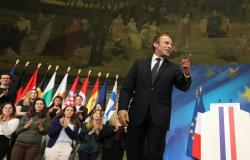The Islamic fasting month of Ramadan is about half way through. Many Muslims worldwide have not eaten anything for two weeks when the sun is up. But for Muslims who cannot or do not want to participate, it can be a mentally difficult period.
Vanuit het geloof zijn er meerdere uitzonderingen op de plicht om te vasten. “Ziekte is een heel duidelijke vrijstelling”, zegt Anouar Ibn el Kadi. De 28-jarige advocaat heeft diabetes type 1 en kan daardoor niet meedoen zonder dat zijn gezondheid in gevaar zou komen. “Vanuit de religieuze leer zijn ziekte, op reis gaan of zwangerschap geldige redenen om niet te vasten.”
Ibn el Kadi betaalt voor elke dag waarop hij niet kan vasten een maaltijd voor een arm gezin. Dat is de bedoeling binnen de islam, tenzij je daar geen geld voor hebt.
Als je ziekte niet chronisch is, haal je de gemiste vastendagen na de ramadan in. Lukt dat inhalen niet, dan doneer je een bedrag dat overeenkomt met de kosten van een maaltijd aan een goed doel.
‘People are ashamed and feel guilty’
Even if someone has an exemption, not being able to participate in fasting can be mentally difficult, says psychiatrist Talha Gökalp Senler. “People are ashamed and feel guilty. This can manifest itself in different forms. Some people deal with it better than others. Seeking mental support can help.”
Omar Tanay advocates more culturally sensitive care. In addition to his work as a doctor, he is also chairman of Medic, an association that deals with healthcare issues among Muslim patients, among others. “Care providers do not always understand how important Ramadan can be for their patients. They then think: as a sick person you already have an exemption, why are you still making things difficult?”
But in some cases, the mental pressure is so great that doctors should more actively look for options with those patients, Tanay says. Only if it is medically justified, he emphasizes.
Senler: “In Ramadan, solidarity is extremely important. This can lead to people trying to fast, with the associated medical risks. People should always consult with their doctor to see what is and is not allowed.”
Vasten tijdens de ramadan in Nederland
Het vasten tijdens de ramadan is een van de vijf zuilen van de islam. Het houdt in dat moslims tijdens de hele maand ramadan tussen zonsopgang en zonsondergang niet eten, drinken of roken. Ook onthouden moslims zich van seks tijdens het vasten.
Lang niet iedereen vast mee. Het Sociaal Cultureel Planbureau doet onderzoek naar de religieuze beleving van moslims in Nederland. De recentste cijfers stammen uit 2015.
Bijna de helft (45 procent) van de ondervraagden met een migratieachtergrond uit Turkije gaf toen aan niet alle dagen van de ramadan mee te vasten. Een kwart deed dat helemaal niet. Bij moslims met een Marokkaanse migratieachtergrond gaf 87 procent aan alle dagen te vasten. Slechts een klein deel (4 procent) zei helemaal niet te vasten.
Samen vormen de Marokkaanse en Turkse Nederlanders het grootste deel van de moslims in Nederland. Wel zijn er ook andere moslims, bijvoorbeeld uit Suriname, Somalië, Indonesië en mensen met een Nederlandse achtergrond die bekeerd zijn.
Some keep up appearances
In addition, there is a group of Muslims who can fast, but do not want to. “They can also experience pressure,” says Senler. Some keep up appearances or avoid the question of whether they are fasting. “How you deal with that kind of stress and how high that peer pressure is can differ per individual.”
“If you do not fast during Ramadan, this is immediately visible,” says the psychiatrist. “With other forms of practice, it is not always immediately clear who does or does not follow a rule of Islam. During Ramadan you can therefore feel even more excluded.”
Tanay acknowledges that people who, for whatever reason, do not fast can be viewed negatively. “But that is not the intention. We as Muslims in particular must be careful about attributing bad qualities or intentions to others, because that can happen to us too.”
‘Ramadan is about much more than not eating’
Ibn el Kadi says he never experiences pressure from others to participate. According to him, if someone does not fast because of an illness, that is understandable. The social aspect concerns him more.
“If you are the only one in a group who does or does not do something, it can be confrontational. I am confronted with my disability due to diabetes.” He occasionally finds it difficult to relate to others who fast. “For example, when you have eaten and people around you are in a different flow.”
According to Ibn el Kadi, there are several misconceptions about Islam. “In the Netherlands we think that everyone as a collective always follows all the rules, while Islam is a religion that you have to experience personally. You are accountable for yourself. You are spared when something is not possible for you to practice. .”
Despite his diabetes, Ibn el Kadi is looking forward to Ramadan. He sees not eating as a small aspect of a month that has a much broader meaning. “Ramadan is about making yourself and the world a little better.”






